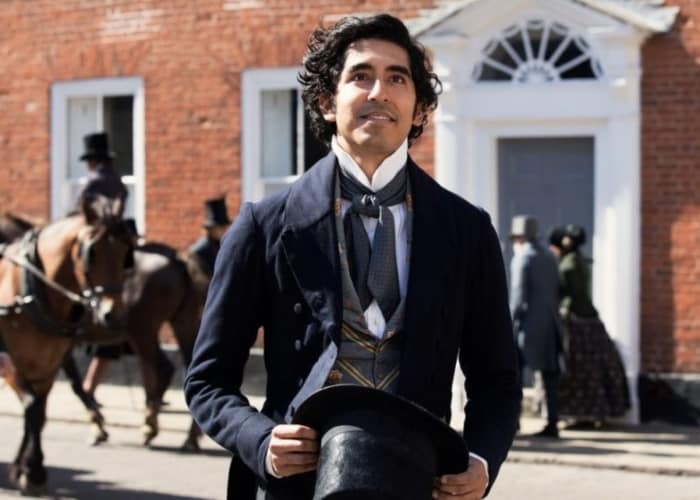Did you see Armando Iannucci‘s The Death of Stalin and think, “It’s cool that this is a bitingly clever, genuinely funny, and original take on a period drama, but wouldn’t it be better if it was cloying and tonally confused”? Well, boy, do I have a movie for you!
Iannucci’s follow-up to Stalin is an adaptation of Charles Dickens’ David Copperfield, a semi-autobiographical novel in which the eponymous hero chronicles his life from childhood to middle age as he experiences his fair share of good fortunes and hardships. The film, titled The Personal History of David Copperfield, traces the same narrative as we follow David (Jairaj Varsani as a child and then Dev Patel as an adult) through his adventures while various supporting characters filter in and out of his life. Some experiences are more perilous, including his time working in a factory as a child, and others are more lighthearted, including time spent with Hugh Laurie as Mr. Dick, a man hopelessly obsessed with King Charles who finds solace from his fixation through kite flying.
To adapt a 600-page novel is to inevitably and necessarily excise some plot points, but while a bildungsroman (or, coming-of-age story) of such length can readily capture Dickens’ blend of misery and comedy, a film adaptation must contend with these tonal shifts in a much more condensed time-frame. Its humor never lands well enough to fully be a comedy, but its dramatic moments are also lacking the weight that could come with patiently sitting with a scene. Whenever a somber or serious moment occurs, the film must quickly move past this in order to make it to the next plot point and character introduction. The two-hour film doesn’t seem to have enough breathing room to fully capture the nuances necessary to make the film resonant and not just amusingly absurd.
Copperfield isn’t a wholly unenjoyable viewing experience, though. Credit here should go to cinematographer Zac Nicholson, who captures the film’s Victorian period setting in lush, vibrant tones. This helps to imbue the various settings with a feeling of personality, and while there is a multitude of locations, the film does allow for them all to appear distinct.
The problem is that anyone familiar with Iannucci’s career — including 2017’s The Death of Stalin, the BBC political sitcom The Thick Of It, and its American counterpart, HBO’s Veep — will find The Personal History of David Copperfield lacking his signature sardonic wit, edge, and pacing. While this film needn’t have rapid-fire dialogue and black comedy, it should have had a strong understanding of the style of humor it was intending to work with. Instead, its tone is jumbled and the film’s navigation of various storylines is muddled, making the whole experience rather tedious.
The film’s source material is rich with clever and beautiful turns of phrase. There are moments with Iannucci’s interest in faithfully adapting Dickens’ spirit is palpable. Copperfield routinely finds himself encountering strong personalities and taking on their voice and mannerisms. It’s not done out of mimicry, but rather an earnest fascination with the people around him and their personal quirks. Iannucci’s career has given life to marvelously idiosyncratic characters in both TV and film, and it’s no stretch of the imagination to think the director may find a fellowship with his protagonist in terms of their shared interest in unique people and the things that make them tick.
Indeed, as muddled as the film can be there, there is an affection for the subject matter that shines through and it helps lessen the blow of a disappointingly unfunny film. There are moments where the characters’ lovable peculiarities come out, such as some scenes early on with Peter Capaldi‘s enterprising and wildly optimistic Micawber, who takes young Copperfield in. Unfortunately, while each character has their charms, the film’s supporting cast is so expansive that there’s rarely enough time spent with any single one.
The film’s problems are those that would be inherent in any adaptation, and perhaps therein lies the issue: a film can only hold so much plot. Iannucci and his co-writer and frequent collaborator, Simon Blackwell, have made changes in order to adapt the story, but watching the film still creates the impression of observing a juggler with one too many balls in the air to make it work.
The best takeaway from the film — and the one that, for all of Copperfield’s faults, I hope people actually pay attention to — is the unconventional but ingenious colorblind casting choices. This choice helps to expand the experiences depicted in the film and to welcome perspectives on the themes that aren’t offered in other adaptations. The source material is still capable of resonating deeply, and the casting choices exemplify the good that can come from pluralizing and diversifying the notion of who can relate to a tale such as this. It also offers Patel another opportunity to showcase his charms and talent, and that’s never a bad thing.
The Personal History of David Copperfield is certainly amusing at times, but at others, it’s a touch too cutesy and kitschy. Perhaps with enough breathing room, these qualities could have been balanced by more weighty moments. But as it is, the film’s somber details are rushed in favor of twee whimsy that becomes grating. The film isn’t without its moments, but it’s too lackluster to be memorable. This Personal History is one that will be easily forgotten.

